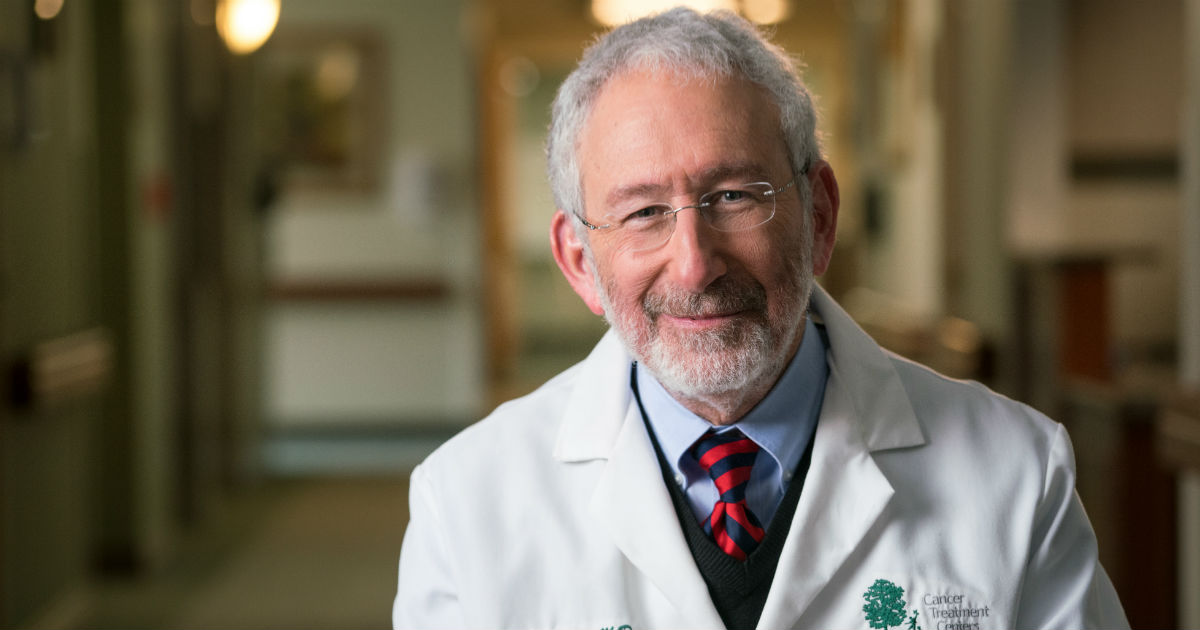
Surgical oncologists are critical players on many cancer patients’ care teams. But many patients don’t know exactly what this specialist does, what kind of training he or she has, or what advancements have changed the field over the past decade. To clear up the confusion, Maurie Markman, MD, President of Medicine & Science at Cancer Treatment Centers of America® (CTCA), answered your questions on surgical oncology in his latest Q&A, Just the Facts about Cancer and Its Treatment, hosted on Twitter. Follow us at #AskDrMarkman. Here’s this week’s chat:
Question: Do all surgeons treat cancer? If so, what’s the difference between a general surgeon and a surgical oncologist?
Answer: In general, general surgical training and requirements to obtain a state license to practice as a surgeon include treating cancer and its symptoms and side effects. It comes down to expertise. Surgical oncologists have received additional years of advanced training specifically in treating cancer and the side effects that come with it. Some surgical oncologists get even more specialized training, through fellowships and other programs, that allow them to focus on specific aspects of the disease, such as breast surgery, or certain treatment approaches, such as robotic surgery.
Q: My father has stomach cancer. If surgery is recommended as his treatment, how should we choose his surgical oncologist?
A: In general, it’s important to consider the training and experience of the treating surgeon and the experience of the institution where the procedure will be performed in deciding what is in the best interest of the patient. If you’re not completely comfortable with the first doctor you meet with, you should feel comfortable in getting a second (and third) opinion from other experts.
Q: With advances in cancer drugs over the past several years, is the surgeon’s role less important in treating cancer?
A: No. In fact, the opposite may be true. In the past, surgery was not commonly used after the cancer was initially treated, and it was limited to patients whose cancers were relatively small in size at the time of diagnosis. Today, surgery may be highly effective when used after first-line chemotherapy—when the tumor has decreased in size—or in specific situations, like in removing metastatic tumors.
Q: For cancer surgery to be deemed successful, do large amounts of normal tissue have to be removed, too?
A: It was once common to remove extensive amounts of normal tissue near the cancer (as in a radical mastectomy for breast cancer). This type of surgery was intended to remove the cancer locally and help prevent it from spreading to other parts of the body. Today, however, cancer surgery is increasingly focused on removing the least amount of normal tissue as possible, such as in limb-sparing surgery for extremity sarcomas. This type of surgery may be followed by radiation therapy and chemotherapy to help further manage the disease.
Q: Do researchers conduct clinical trials on surgical techniques for treating cancer in the same way as new drugs are being studied?
A: Not necessarily. With new anti-cancer drugs, the U.S. Food and Drug Administration (FDA) has strict regulatory oversight of the process, including overseeing the details of protocols designed to prepare the drugs for commercial sale. Unless they involve a novel surgical device, new surgical techniques may not need to progress to phase 3 of a trial, which determines safety and effectiveness before cancer treatments are approved. Rather, studies published in peer-reviewed literature supporting a new surgical approach may be more in line with phase 2 drug studies, in which there is no direct comparison to an existing treatment.
Q: We’ve heard a lot about advances in cancer treatment involving immunotherapy, but not so much about surgical approaches. Have surgical treatments for cancer undergone any major advances over the past decade?
A: Yes. Innovation in surgical oncology is a dynamic and rapidly evolving arena, with important new advances quickly moving into routine use. Examples include robotic, minimally invasive surgery and novel imaging approaches that have revolutionized the treatment of certain cancers, reducing the risk of complications, decreasing hospitalization times and accelerating the return to daily activities.
Q: Are new surgical approaches always better than standard or older treatments?
A: No. As in all areas of medicine, it would be inappropriate to simply assume that a new approach to disease management will always be better than an existing strategy. A recent example is opting for minimally invasive surgery instead of open surgery to treat early-stage cervical cancer. Data, as well as the results of a randomized trial, have revealed poorer outcomes associated with the minimally invasive approach.
Q: I know that some treatments are used in combination, but some shouldn’t be combined, right? Aren’t there some anti-cancer agents that need to be used with caution in patients who are also having surgery?
A: Yes, a critical example is the widely prescribed and highly beneficial anti-angiogenic, bevacizumab, a targeted therapy drug used to treat some colorectal, lung, kidney, cervical and ovarian cancers and some glioblastomas. Clinical experience and trial data have revealed that when given near the time of major surgical procedures, there’s an increased risk of serious side effects, including delayed wound healing and post-surgical vascular complications.
Q: In addition to treating cancer, some surgical approaches are also used to prevent cancer or to manage complications from an existing cancer, right?
A: Yes, this is an important and evolving role for surgery in managing cancer. Prophylactic surgery to remove the breast and/or ovaries has been shown to prevent cancer in some women with a hereditary risk, such as a BRCA mutation. Likewise, when a non-fractured bone is extensively involved with cancer, prophylactic surgery to prevent a devastating fracture of a weight-bearing bone may be beneficial.
Q: Is it possible that more than one type of surgeon may be involved in a cancer patient’s care?
A: Yes. For example, it’s common for a breast cancer patient’s team to have a plastic surgeon onboard, to assist the breast surgeon or surgical oncologist with breast reconstruction after the tumor is removed. Also, when widespread ovarian cancer has invaded the abdominal cavity, a urologic oncologist or a surgical oncologist may assist the gynecologic oncologist, depending on the extent and location of the cancer.
Learn how cancer cells use supervillain traits to resist treatment.



